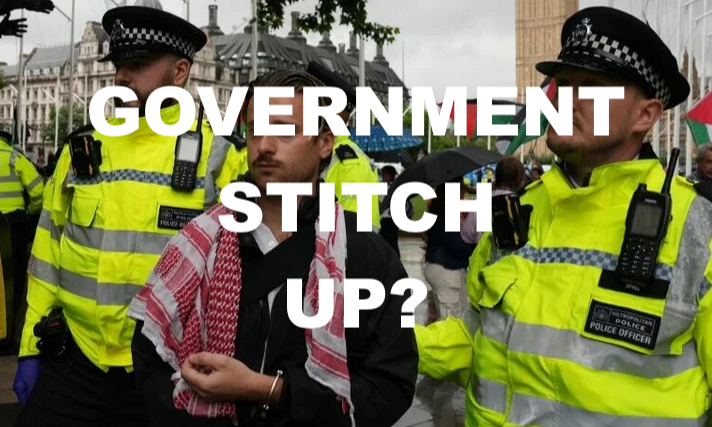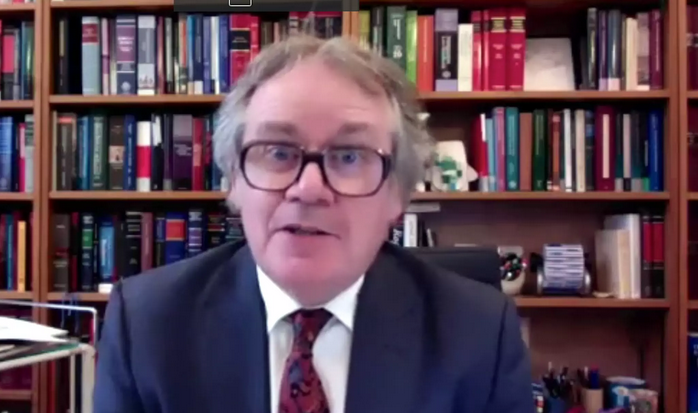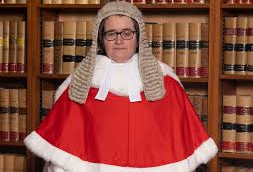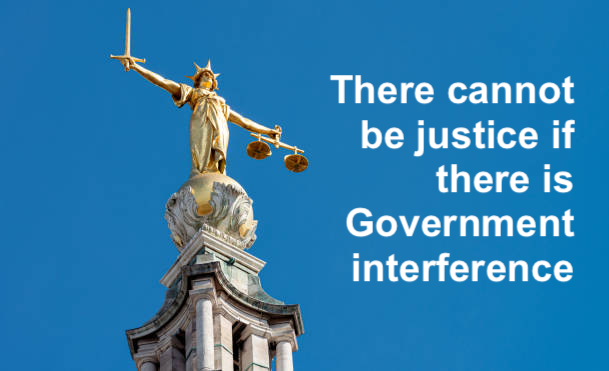Dirty Tricks: Are the Government Trying to Stitch Up the Judicial Review?

TetleysTLDR: The article
You’d be forgiven, amid the near-total media blackout of the case, for missing the fact that the government appears to be meddling in one of the most important civil liberties cases in decades. Just days before the judicial review into the proscription of Palestine Action was due to begin, the presiding judge: Sir Martin Chamberlain, who granted the review in the first place was suddenly removed without explanation. In his place a three-judge panel including Sir Jonathan Swift, the government’s former top lawyer who has consistently ruled in the state’s favour and Dame Karen Steyn, who recently upheld Britain’s right to export F-35 components to Israel during the Gaza genocide. The panel is headed by Dame Victoria Sharp, whose twin brother is a Tory mega-donor with links to Israel’s arms industry. Campaigners call it a stitch-up. They’re right to. This isn’t administration, it’s state interference masquerading as justice.
Tetleys TLDR: The Long Bit
The sudden removal of Sir Martin Chamberlain from the judicial review of Palestine Action and his replacement with a three-person panel has triggered alarm from legal experts and campaigning groups. The media that is reporting it have accused the government (or forces close to it) of orchestrating a 'cherry-picking' of judges in order to rig the outcome. Novara Media
The abrupt reshuffle raises serious questions about judicial independence, transparency and the fairness of a trial that will determine whether a widespread campaign of arrests and criminalisation under terror law was lawful. It is easy to argue that we have to view these manoeuvres not as procedural housekeeping, but as a dirty tricks operation: a stitch-up of justice by state power.
The Context: Proscription, protest and Judicial Review
- In July 2025, the Home Secretary designated Palestine Action as a 'terrorist' organisation under the Terrorism Act 2000. Being a member of or supporting the group, even via a placard or a sign, now carries a penalty of up to 14 years in prison. Since the proscription, there have been over 2,200 arrests of protesters, more than during the entire war-on-terror era. Wikipedia
- The co-founder of Palestine Action, Huda Ammori, brought a challenge to the ban, and on 30 July 2025 the High Court granted permission for a full judicial review. Chamberlain accepted that 'it was reasonably arguable' that the proscription breached rights to free expression and assembly and that the Home Office had failed to consult the group properly. Garden Court North Chambers
- In September, the government attempted to block the challenge by forcing a different legal route (via a specialist tribunal rather than judicial review), but lost: on 17 October the Court of Appeal upheld the right of Ammori to proceed via judicial review and allowed additional grounds to be argued (such as that the Home Office failed to follow its own policy). Wikipedia
- The substantive hearing was scheduled for 25–27 November 2025. As recently as 17 November, court documents and correspondence continued to confirm Chamberlain as the presiding judge. Novara Media
So far, a textbook example of exercise of judicial oversight over state overreach. Until, that is, the rug was pulled from under the process.

Sir Martin Chamberlain: the Judge removed without explanation at the last minute
The Judge Swap: unusual, unexplained and undermining confidence
On the run up to the hearing, Chamberlain was suddenly removed from the case. Without public explanation, he was replaced by a three-judge panel: Dame Victoria Sharp, Dame Karen Steyn and Sir Jonathan Swift. Novara Media
- This last-minute switch is highly unusual. Judges are rarely replaced this close to a hearing particularly once permission has been granted and court correspondence continues to identify them. The Guardian
- Astonishingly, the press office for the judiciary declined to say why the change was made. The Ministry of Justice also refused to comment. The Guardian
- The absence of any credible publicly stated reason inevitably leads to suspicion: was this a genuine administrative reprieve, or a deliberate effort to stack the bench?
Given the stakes: thousands criminalised, core civil liberties under threat, such opacity feels less like a quirk of court scheduling than a political manoeuvre to influence outcome.
Why the new panel smacks of a 'stitch-up'
The composition of the new panel furnishes strong cause for concern, almost as if chosen specifically to secure a government-friendly result.
Sir Jonathan Swift: the Government’s former 'go-to' lawyer
- Swift served from 2006 to 2014 as 'first treasury counsel', the government’s top litigation lawyer, representing ministries such as Defence, Treasury, Justice and the Foreign Office in major litigation. Novara Media
- The state paid him nearly £1 million between 2010 and 2013. Novara Media
- More recently, in June 2022, Swift ruled in favour of the government over the controversial asylum-seeker deportation 'Rwanda plan', describing the potential risk to refugees as 'in the realms of speculation'. Novara Media
- It is therefore manifest: Swift’s professional identity is deeply embedded in representing and defending the British state. That a judge so steeped in government litigation history is now hearing a case attacking a government ban immediately reads like a conflict of interest or at best a predictably one-sided choice.

Dame Karen Steyn: previously ruled for UK arms exports to Israel
- In June 2025 Steyn (with another judge) ruled that the UK’s export licences for components of F-35 fighter jets to Israel were lawful even though the government conceded that those parts could be used to facilitate or commit violations of international humanitarian law in Gaza. Novara Media
- That case had been one where Chamberlain granted permission for review; yet, at last minute, he was removed. Now Steyn sits on the panel hearing another Palestine-related challenge. The appearance of pattern is hard to ignore.

Dame Victoria Sharp: seniority, but also family ties
- Sharp is President of the King’s Bench Division (administrative court) and thus technically senior enough to warrant inclusion. Novara Media
- Her twin brother is Richard Sharp: a former JP Morgan and Goldman Sachs banker, multimillionaire Tory donor, and someone with historical links to Israel-linked finance and arms manufacture via big banks that invested in companies such as Elbit Systems, one of the prime targets of Palestine Action. Wikipedia
- Given that the very companies Palestine Action target benefit from Sharp’s brother’s networks, people familiar with the conflict or the arms trade would find her presence on the bench deeply troubling.

Add this up: a three-judge panel where two judges have recent records of ruling in favour of government or establishment interests, and the third has direct familial ties to financial and arms-industry interests under criticism. In a case about whether dissent and protest should be swept under the terrorism label, this does not look like a neutral, independent court. It looks, to borrow the words of campaigners, like a stitch-up.
The stakes: not just a court case: the future of protest, dissent and democracy
We are not dealing here with a minor procedural dispute. Everything is at stake:
- If the ban on Palestine Action is upheld, more than 2,200 people, many arrested simply for holding signs or attending a protest, could see charges stand, or future arrests continue. That could represent the largest anti-war crackdown in UK history under the guise of 'counter-terror'. Reuters
- If the court allows judicial review but issues an artificially narrow ruling, or bends in favour of the government, that will set precedent for future proscription of protest groups. The ban on Palestine Action may be just the first of many.
- Worse: it will send a chilling signal to any group daring to challenge government policy on war, arms or human rights: that the state can silence you through terror laws and that even impartiality of the courts is not safe.
This isn’t just about one group. It’s about whether civil liberties and the right to protest: physically, vocally, publicly survive or perish under a creeping carapace of state power.
Why we must call it what it is: dirty tricks, not judicial mis-administration
Some defenders might argue this was a mere administrative adjustment or an internally justified decision by senior judges. But that defence collapses under scrutiny:
- The timing: immediately before a high-profile hearing makes plain this is not routine.
- The lack of any public explanation or transparent rationale breaches the very norms required to sustain public confidence in the judiciary. A system that swaps judges at random, without transparency, cannot maintain legitimacy.
- The particular choice of judges with overt links to government interests and the arms trade suggests foreknowledge of what the case is about and a desire to tilt the odds.
Seen in this light, the whole affair is better understood as a politically motivated operation: an establishment dirty trick designed to smother a dangerous (for them) legal challenge before it can truly begin.
The appeal process: a second front of attack?
Even as this judicial review proceeds, the government’s earlier attempt to force the case through a specialist tribunal rather than a court underlines that the judiciary swap is only one prong of a broader assault on accountability. The government tried to deny the right of protest groups to a standard judicial review at all. Garden Court North Chambers
And now, with the appellate defeat the government is clearly marking its territory: by proscribing protest as terrorism, by forcing tribunals rather than courts, and when it must face a court by switching judges at the last minute. That combination reeks of a deliberate strategy to insulate state power from legal challenge. If appeals to higher courts or after that to the appellate courts, are limited by procedural device or closed-door procedure (as has already been mooted with secret hearing regimes), then the protective shield will be near-impenetrable. The Guardian
In short: a Government up to its nuts in complicity of a Genocide is fighting this war on multiple fronts and the judiciary swap is just the latest blow.

What must happen now: and what should be demanded
If the courts, civil society and the people of this country value justice and democracy, then several things must happen immediately:
- The court (or higher judicial authority) must publish a full, public explanation of why Chamberlain was removed. Transparency is the bare minimum to restore confidence.
- Any conflicts of interest: past representation of government, financial ties to arms-industry interests must be fully disclosed and mechanisms introduced to ensure future panels are demonstrably independent.
- The hearing must proceed with full public scrutiny: open court, open media access, not cloak-and-dagger secret hearings, not for a case of this magnitude.
- If the result upholds the proscription, the decision should be treated as a verdict on civil liberties, not a narrow ruling on paperwork. The political and moral consequences must be laid bare.
- Ultimately, reform is needed: the use of proscription against protest groups, and the way judges are assigned to politically sensitive cases, must be re-examined. Judicial independence should not be optional when the subject is Palestine or state power.
We cannot allow terror laws, inherited from the war on terror, to become tools for suppressing dissent especially dissent over state crimes abroad, arms sales, imperial complicity and genocide. To let this stand would be to turn Britain into a land where even protest is criminal.
A Stitch-Up, not a Judicial Review
The replacement of Chamberlain a judge who had already granted permission for review and been confirmed repeatedly on court documents with a government-friendly, arms-linked three-judge panel is not just irregular. It is ominous. It is not about legal housekeeping; it is about a political intervention dressed up as legal process.If justice means anything in this country, if the rule of law, public trust, and civil liberties are not to be hollow slogans, the courts must answer. And the public must hold them to account. This is not mere theatre. This is an attempt to stitch up justice itself.
If the government wins this judicial review, the consequences will be seismic, not just for Palestine Action, but for every protest movement and for the very idea that the courts can act as a check on executive power.
1. Proscription becomes a political weapon
A victory would effectively rubber-stamp the use of terrorism law against domestic protest groups. Any organisation causing political discomfort: climate activists, anti-war groups, anti-racist networks, even trade unionists could be next. The Terrorism Act would stop being about terrorism and start being about control.
2. Thousands of arrests stand
Over 2,200 people have already been arrested since the ban. A government win means those charges stick. People who attended a demo, held a placard, or shared a slogan could face years in prison,the largest anti-protest crackdown in modern British history, legitimised overnight.
3. Judicial independence takes a bullet
If this stitched-up panel sides with the state, the message is clear:
Challenge the government, and the courts will be reshuffled until the 'right' result is guaranteed.
Public trust in the judiciary, already savaged could collapse entirely.
4. Protesting becomes a high-risk act
If membership, support or even association with a direct-action group is treated as terrorism, ordinary people will be terrified to march, donate, speak, or organise. That chilling effect is the point: a government win would make fear the central organising principle of public life.
5. Arms dealers get legal protection
A victory hands a gift to Elbit Systems, Pearson Engineering, BAE, Lockheed Martin and every UK-linked arms manufacturer. Sabotage becomes terrorism. Exposure becomes terrorism. Even boycotts could be targeted next. The state will have successfully criminalised resistance to war crimes.
6. Palestine becomes the exception that swallows the rule
Britain already bends its laws whenever Israel is involved. A government win says:
We will throw civil liberties into the sea if necessary to protect our alliance with an apartheid regime.
That precedent won’t stay confined to Palestine.
7. Future legal challenges die before they’re born
After a victory engineered by judge-swapping and procedural manipulation, other campaigners will learn the lesson: the courts are no longer neutral ground. The executive can tilt the table whenever it needs to.
In short: if the government wins, Britain loses.
- We lose civil liberties.
- We lose meaningful protest rights.
- We lose judicial independence.
- We lose any pretence that terror law is about terrorism.
The twist: if Palestine Action loses now, the appeals process becomes the last line of defence. If they win now, the appeals process becomes the government’s last weapon.
Either way, this judicial review is only the beginning. The real constitutional battle about protest, proscription and state power will be fought at the appellate level, and the government knows it. That’s why they’re stacking the deck early.
Tetley is a left of centre writer and retired musician based in the UK. A former member of the Labour Party, he writes political analysis exposing Britain’s authoritarian drift, the criminalisation of protest, and the erosion of civil liberties.
A bit of shameless self-plugging here. This is www.TetleysTLDR.com blog. It's not monetised. Please feel free to go and look at the previous blogs on the website and if you like them, please feel free to share them.

